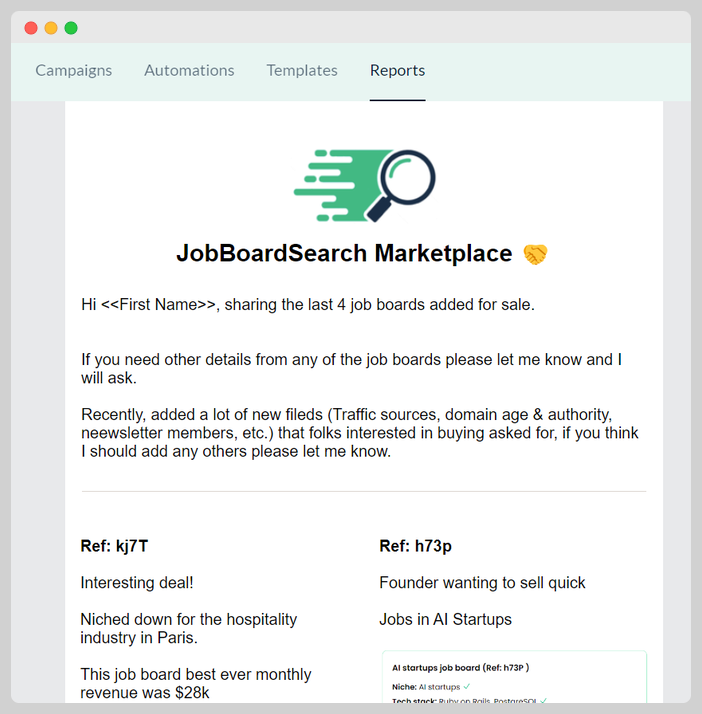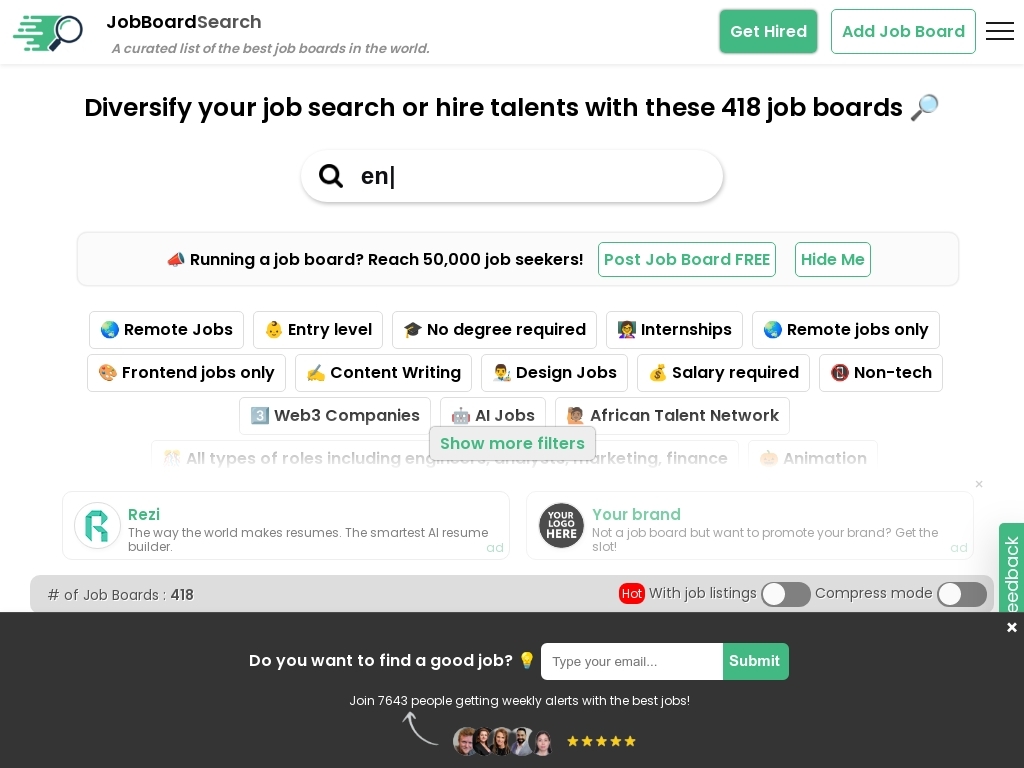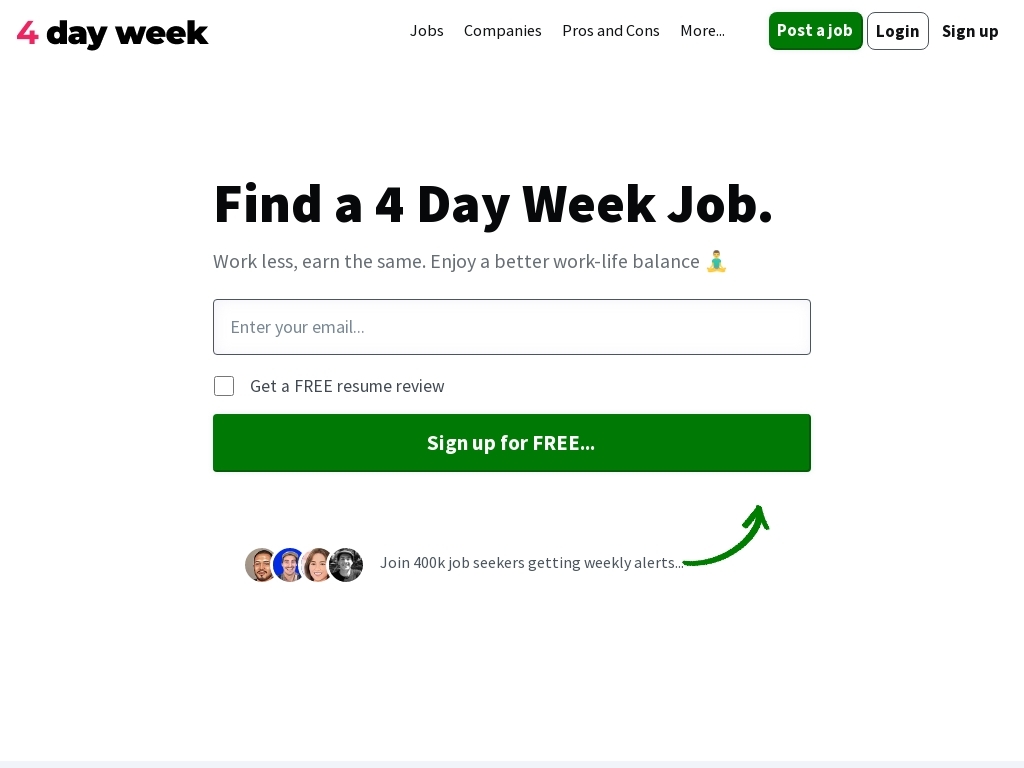
How Rod Turned a Job Board Directory Into a $40K Business
Who is Rodrigo Rocco?
Rod, the founder of JobBoardSearch, is a self-taught coder from Mallorca, Spain, who started coding at age 12, later studied Computer Systems Engineering, and transitioned to web development after leaving university.
What problem does JobBoardSearch 🔎 solve?
JobBoardSearch solves the hassle of finding niche job boards by offering a comprehensive directory, making it easier for job seekers and board creators to connect.


Founder-Market Fit
Skills
What skills did Rodrigo Rocco have that led to their success?
How did Rodrigo come up with the idea for JobBoardSearch 🔎?
Rod came up with the idea for JobBoardSearch by chance when he noticed a gap in the market after StackOverflow Jobs announced its closure. He stumbled upon a tweet by Pieter Levels discussing this event, which triggered curiosity among people looking for alternatives. This sparked Rod's interest, leading him to quickly create a simple directory of job boards as an experiment.
Rod's initial MVP was built in just five hours, showing his desire to seize the moment and see how the community would react. He shared his creation under Levels' tweet, which garnered attention and engagement from job board founders, validating his idea. Encouraged by the positive response and direct advice from Levels to monetize the project, Rod was motivated to transition his directory into a business.
Throughout the process, he faced the challenge of how to monetize, which was solved by offering premium features like sponsored slots and brand highlights, based on community feedback. Rod learned the importance of being attentive to customer suggestions and swiftly adapting, turning a spontaneous project into a thriving business, demonstrating how unexpected opportunities can pave the way for innovation.
How did Rodrigo Rocco build the initial version of JobBoardSearch 🔎?
Building the initial version of JobBoardSearch took just 5 hours, with Rod leveraging his web development expertise to quickly create a minimum viable product (MVP). He constructed the site using raw PHP in a single index.php file without frameworks, integrating basic HTML, CSS, JavaScript, and jQuery. The process was straightforward due to his familiarity with coding, although the speed and simplicity likely presented challenges in ensuring robustness and scalability. The first prototype was a simple directory listing of job boards, which garnered significant attention after a timely tweet, leading to direct engagement and subsequent iterations to add more job boards and features.
How did Rodrigo launch JobBoardSearch 🔎 and get initial traction?
Twitter Post Engagement
Rod launched JobBoardSearch by leveraging a tweet from Pieter Levels about the shutdown of StackOverflow Jobs. In just 5 hours, Rod built a basic directory of job boards and posted it as a reply under Pieter's tweet. Pieter liked the post and retweeted it, helping generate substantial interest from job board founders who reached out to list their own boards.
Why it worked: Using a high-visibility platform like Twitter, especially where industry leaders like Pieter Levels engage, allowed Rod to tap into an existing audience that was already interested in finding alternatives to StackOverflow Jobs. The retweet from a well-known figure amplified this reach effectively.
Premium Listings and Sponsored Slots Introduction
A few months after the initial launch, Rod introduced monetization features like premium listings and sponsored slots after receiving advice from Pieter Levels. He tweeted about these options, and almost immediately, the "4 day week" job board acquired a Gold slot. Within minutes, two more purchases were made, validating the demand for premium visibility.
Why it worked: JobBoardSearch addressed a niche need for job board visibility just as the market needed such a solution. The immediacy of purchases upon announcing paid options showed latent demand, which was leveraged perfectly by creating urgency and exclusivity around the sponsored slots.
Viral Reddit Post
Rod then made a post on Reddit about JobBoardSearch, resulting in viral attention with 790,000 views in just 24 hours. This sudden surge in traffic led to 48,000 unique visitors to JobBoardSearch.com, demonstrating substantial interest and engagement.
Why it worked: Reddit's format, which encourages community interaction and content sharing, allowed the post to spread rapidly. The engaging nature of the content, combined with its relevance to a wide audience seeking job board directories, maximized its viral potential.
Metrics:
- 48,000 unique visitors from the viral Reddit post.
- Significant increase in website traffic and visibility.
What was the growth strategy for JobBoardSearch 🔎 and how did they scale?
JobBoardSearch grew significantly through Twitter by building in public. The founder shared regular updates, engaged with followers, and gained visibility through meaningful interactions and promotions from influential figures like Pieter Levels. This strategy helped attract job board founders and job seekers by fostering a community and encouraging discussions about the site.
Why it worked: Twitter allowed JobBoardSearch to tap into a specific niche of job board founders and job seekers. By consistently updating and interacting with this audience, they created a strong presence and credibility in their field, leading to widespread recognition without spending on ads.
Reddit became a viral channel for JobBoardSearch when a post the founder made achieved 790K views in just 24 hours. This significantly boosted the site’s visibility and led to a spike in unique visitors, reaching over 48K.
Why it worked: Reddit offers a platform where potentially viral discussions can attract massive attention quickly. By posting about JobBoardSearch in relevant subreddits, the content reached a wide audience curious about job board alternatives, creating massive exposure and driving substantial traffic.
Programmatic SEO
The site employed programmatic SEO leveraging data from job boards and dynamically generating titles and meta descriptions using OpenAI API. This method was used to enhance visibility on search engines and drive organic traffic.
Why it worked: Programmatic SEO helped target specific keywords that job seekers searched for, resulting in better search engine rankings. The automation with AI provided a scalable way to manage SEO without manually writing out each description, improving efficiency and reach.
Community Building on Telegram
JobBoardSearch used Telegram to build a community with over 5,300 members. Here, job ads were posted regularly, providing a steady flow of opportunities for job seekers and keeping them engaged with steady updates.
Why it worked: Telegram's group messaging capabilities allowed JobBoardSearch to directly connect with and update job seekers in real-time, ensuring high engagement. This channel not only served as a platform for job ads but also as an interactive community space, nurturing user loyalty and retention.
What's the pricing strategy for JobBoardSearch 🔎?
JobBoardSearch offers paid directory listings with plans like Sticky, Highlight, and Custom Color, alongside Gold, Silver, and Bronze sponsored slots, plus ad slots at $500 each.
What were the biggest lessons learned from building JobBoardSearch 🔎?
- Build in Public: Rod's journey highlighted the power of building in public on Twitter, which continuously attracted attention and interest without spending on ads. Aspiring founders can leverage platforms where their target audience is active to foster organic growth.
- Monetize Based on Demand: Initially, there was no intention to monetize JobBoardSearch, but the demand from job board founders led to premium listings and sponsorship slots. Listen to market needs and create monetization strategies that align with those needs.
- Network and Collaborate: The success of JobBoardSearch was partly due to collaborations and suggestions from influential figures like Pieter Levels. Building a supportive network can provide valuable feedback and opportunities.
- Adapt and Innovate: Expanding features like job fetching using APIs and crossposting on various platforms kept the service relevant and useful. Continual innovation based on user feedback keeps a business competitive and valuable.
- Stay Resilient: Despite initial challenges, including not planning to monetize, resilience and willingness to adapt strategies based on feedback helped JobBoardSearch reach impressive milestones. Perseverance is key in entrepreneurship.
Discover Similar Business Ideas Like JobBoardSearch 🔎
|
|
Idea
|
Revenue
|
|---|---|---|
|
4 Day Week
|
"Job board for flexible 4-day week roles."
|
$83.3K
monthly
|
More about JobBoardSearch 🔎:
Who is the owner of JobBoardSearch 🔎?
Rodrigo Rocco is the founder of JobBoardSearch 🔎.
When did Rodrigo Rocco start JobBoardSearch 🔎?
2022
What is Rodrigo Rocco's net worth?
Rodrigo Rocco's business makes an average of $7.32K/month.
How much money has Rodrigo Rocco made from JobBoardSearch 🔎?
Rodrigo Rocco started the business in 2022, and currently makes an average of $87.8K/year.

Download the report and join our email newsletter packed with business ideas and money-making opportunities, backed by real-life case studies.

Download the report and join our email newsletter packed with business ideas and money-making opportunities, backed by real-life case studies.

Download the report and join our email newsletter packed with business ideas and money-making opportunities, backed by real-life case studies.

Download the report and join our email newsletter packed with business ideas and money-making opportunities, backed by real-life case studies.

Download the report and join our email newsletter packed with business ideas and money-making opportunities, backed by real-life case studies.

Download the report and join our email newsletter packed with business ideas and money-making opportunities, backed by real-life case studies.

Download the report and join our email newsletter packed with business ideas and money-making opportunities, backed by real-life case studies.

Download the report and join our email newsletter packed with business ideas and money-making opportunities, backed by real-life case studies.









